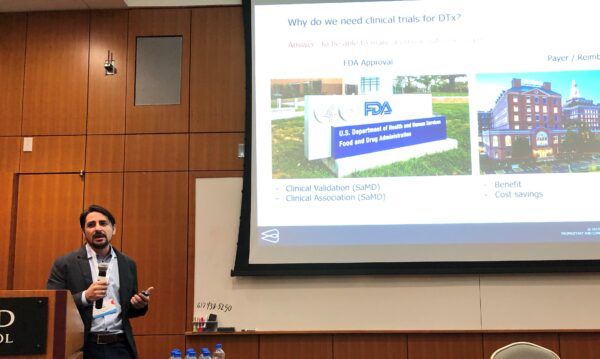
Biorasi VP program development Wayne Bowden gives a presentation at the DTx East conference, Boston, Sept. 26, 2019.
Any product that makes a claim of some clinical outcome will ultimately have to undergo clinical trials in order for the Food and Drug Administration to approve it and for payers to cover it. That’s no different when it comes to digital therapeutics, but as with many new classes of product, running clinical trials for them presents some unique challenges, as well as new opportunities.
At the DTx East conference in Boston Wednesday, the challenges to running clinical trials of digital therapeutics was the topic of a presentation by Wayne Bowden, vice president for program development at Biorasi, a contract research organization based in Miami.

Behavioral Health, Interoperability and eConsent: Meeting the Demands of CMS Final Rule Compliance
In a webinar on April 16 at 1pm ET, Aneesh Chopra will moderate a discussion with executives from DocuSign, Velatura, and behavioral health providers on eConsent, health information exchange and compliance with the CMS Final Rule on interoperability.
Despite the need for clinical trials, the development of technology has outpaced the way trials are run, Bowden said. And running them has become an expensive and inefficient business, with clinical research and development costs skyrocketing over the last few years to become too expensive, while the trials themselves frequently report top-line results behind schedule and go over budget. Because of these factors and because digital therapeutics are such a novel field, Bowden said, there is significant room for finding new ways for how trials of the products are conducted.
“We really have an opportunity because this is such a nascent industry, and nobody really has a model yet for how best to run these trials,” Bowden said. “But we have an opportunity to take a chance and a risk on some new technologies.”
For example, an advantage that digital therapeutics have over drugs from a clinical trials standpoint is that they can collect data in real time.
“The benefit of a digital therapeutics solution is that in many cases, you can bring it to the market and not only test it in a clinical trial setting, but really test it in the market,” said MediSafe CEO Omri Shor in an interview on the sidelines of the conference.

A Deep-dive Into Specialty Pharma
A specialty drug is a class of prescription medications used to treat complex, chronic or rare medical conditions. Although this classification was originally intended to define the treatment of rare, also termed “orphan” diseases, affecting fewer than 200,000 people in the US, more recently, specialty drugs have emerged as the cornerstone of treatment for chronic and complex diseases such as cancer, autoimmune conditions, diabetes, hepatitis C, and HIV/AIDS.
But the flipside, as pointed out in Bowden’s presentation, is that it also means standardization in the analysis of those data is critical, especially as they come from a variety of different sources, such as wearables, telemedicine, electronic patient-reported outcomes and the like.
There are also challenges to how the trials are designed, said Cognoa CEO Brent Vaughan, in an interview on the sidelines of the conference. “The endpoints and study requirements can be quite different for a digital therapeutic,” he said.
In a randomized, controlled trial of a drug – depending on the disease, its severity and what treatments are available – the control group might receive an active control such as the existing standard of care or physician’s choice of best available therapy, a combination of placebo with an active drug or placebo alone. With a digital therapeutic, there needs to be a discussion with the Food and Drug Administration about what the placebo control will be, Vaughan said. He pointed to the example of Akili Interactive, which used a sham game as the control in a trial of its mobile app game for children with autism.
Bowden – among others at the conference – remarked that unlike drugmakers, digital therapeutics companies typically don’t have a billion dollars to spend on running a clinical trial. At the same time, the data collection component of studies is different, with input and output taking place on the same device and the ability to merge collection and analysis into one framework.
His presentation cited estimates that it takes 10 years and $2.6 billion to bring a drug or device to market. But digital therapeutics developers don’t have to work slowly.
“With digital therapeutics there’s really an opportunity to use … the new technologies out there to run these trials differently,” he said.
Photo: Alaric DeArment, MedCity News












